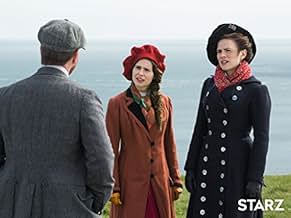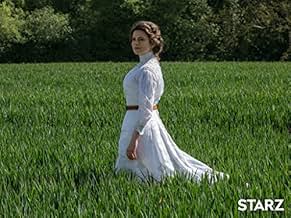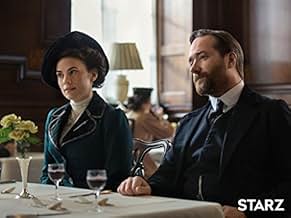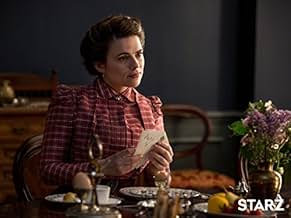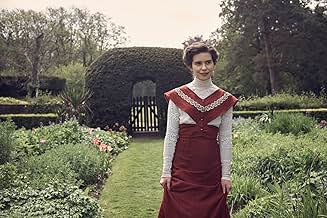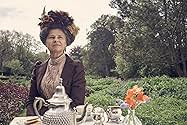As divisões sociais e de classe na Inglaterra do início do século XX através da interseção de três famílias, os ricos Wilcoxes, os gentis e idealistas Schlegels e os Basts de classe média ba... Ler tudoAs divisões sociais e de classe na Inglaterra do início do século XX através da interseção de três famílias, os ricos Wilcoxes, os gentis e idealistas Schlegels e os Basts de classe média baixa.As divisões sociais e de classe na Inglaterra do início do século XX através da interseção de três famílias, os ricos Wilcoxes, os gentis e idealistas Schlegels e os Basts de classe média baixa.
- Indicado para 1 prêmio BAFTA
- 1 vitória e 12 indicações no total
Explorar episódios
Avaliações em destaque
This series is quite beautiful in terms of scenery, score and cinematography, and though the dialogue is a bit meandering and often feels to be of little consequence I did enjoy the dynamic between the three siblings and their aunt.
The main issue I have with the series is the total lack of chemistry between any of the romantic pairs. Absolutely none of their relationships felt believable.
The only characters I felt had any potentially sexual chemistry was Mrs Wilcox and Margaret, so to see Margaret later paired with the bland, unlovable and callous Mr Wilcox was baffling. The feelings which they supposedly have for each other do not read as authentic, and so Margaret becomes a less likeable character as a consequence.
Furthermore, several pieces of the story feels disjointed - I'm thinking particularly of the space between episodes 1 and 2 and the of end; both places where large amounts of time is skipped over. This kind of skipping is of course typical of epilogues, but in this case it felt weirdly jarring. They were obviously trying to wrap the series up in a neat little bow, but if felt anything but neat.
Without spoiling the end, the events which lead to the resolution seemed extremely cheap and almost offensive in how certain characters were disposed of.
If nothing else the series did make me curious to read the book Howard's End and see whether the series fails due to going too far away from the source material, or not having the proper means to give the source material life.
The main issue I have with the series is the total lack of chemistry between any of the romantic pairs. Absolutely none of their relationships felt believable.
The only characters I felt had any potentially sexual chemistry was Mrs Wilcox and Margaret, so to see Margaret later paired with the bland, unlovable and callous Mr Wilcox was baffling. The feelings which they supposedly have for each other do not read as authentic, and so Margaret becomes a less likeable character as a consequence.
Furthermore, several pieces of the story feels disjointed - I'm thinking particularly of the space between episodes 1 and 2 and the of end; both places where large amounts of time is skipped over. This kind of skipping is of course typical of epilogues, but in this case it felt weirdly jarring. They were obviously trying to wrap the series up in a neat little bow, but if felt anything but neat.
Without spoiling the end, the events which lead to the resolution seemed extremely cheap and almost offensive in how certain characters were disposed of.
If nothing else the series did make me curious to read the book Howard's End and see whether the series fails due to going too far away from the source material, or not having the proper means to give the source material life.
... I much preferred the 1992 Emma Thompson/Anthony Hopkins/James Ivory movie version. Perhaps I'm too much a fan of Merchant Ivory films. It's a pleasure watching Matthew Macfadyen in anything. And I look forward to future roles for Hayley Atwell. It's not that this mini-series version is inferior. It simply didn't arouse as much of my sympathy for any of the characters as the 1992 version.
I fell in love with Emma Thompson's portrayal of Margaret Schlegel in the 1990s film version. I loved the film as a whole. But this version is just as worthy, and being a four-hour series, can embrace a larger picture and more importantly, a larger canvas of characters.
Leonard Bast is central to the plot, but in the film, he was a cipher, a vessel and a canvass for the sisters to paint. I read the book and while women of their class might have seen him that way, I didn't, and I liked that he was given more of a presence and personality. In the film there was no real connection between him and Helen, while in this version, there is one, however tenuous and fleeting. I felt it gave him the respect he deserved, and in doing so strengthened the underlying message.
I also preferred this version of Henry. Hopkins is brilliant, but to me, Margaret's attraction to him in the film made little sense. No, not even in Edwardian times. She was fierce and self-possessed, he was dull and rigid, and she didn't need his money or stamp of approval. I needed to buy the connection and this version made it breath so much more freely. Not even Emma Thompson can convince me of something unpalatable.
Some stories just need more time to unfold. Four hours worked well enough, whereas two and half, or even three, didn't. I still love the film version and Helena Bonham Carter is just irreplaceable, but Philippa Coulthard makes a great Helen too People who want to have an issue with Jackie Bast or a few servants or doctors being minorities can fuss away about it all they want. It might be historically unlikely, but it is by no means historically "incorrect" and it shouldn't jar anyone who is paying attention to what matters in the story. If anything it adds to it.
I loved this version. Kudos to all involved, especially Atwell, Coulthard, McFadyen, and the young actor playing Tibby. Oh, and Ullman. It can be scary to take on a classic that has supposedly been "claimed" by film deities. They did it proud.
Leonard Bast is central to the plot, but in the film, he was a cipher, a vessel and a canvass for the sisters to paint. I read the book and while women of their class might have seen him that way, I didn't, and I liked that he was given more of a presence and personality. In the film there was no real connection between him and Helen, while in this version, there is one, however tenuous and fleeting. I felt it gave him the respect he deserved, and in doing so strengthened the underlying message.
I also preferred this version of Henry. Hopkins is brilliant, but to me, Margaret's attraction to him in the film made little sense. No, not even in Edwardian times. She was fierce and self-possessed, he was dull and rigid, and she didn't need his money or stamp of approval. I needed to buy the connection and this version made it breath so much more freely. Not even Emma Thompson can convince me of something unpalatable.
Some stories just need more time to unfold. Four hours worked well enough, whereas two and half, or even three, didn't. I still love the film version and Helena Bonham Carter is just irreplaceable, but Philippa Coulthard makes a great Helen too People who want to have an issue with Jackie Bast or a few servants or doctors being minorities can fuss away about it all they want. It might be historically unlikely, but it is by no means historically "incorrect" and it shouldn't jar anyone who is paying attention to what matters in the story. If anything it adds to it.
I loved this version. Kudos to all involved, especially Atwell, Coulthard, McFadyen, and the young actor playing Tibby. Oh, and Ullman. It can be scary to take on a classic that has supposedly been "claimed" by film deities. They did it proud.
I really have enjoyed the series but some of the casting just is so out of place it's incredibly distracting. At first I was confused by the doctor treating an upper middle class family in Edwardian England being Asian. Then with the servant being black which would have been extremely unusual but not entirely implausible. But then with an interracial marriage that raises NO eyebrows? It stretches incredulity and pulls you directly out of the story.
Colorblind casting only works when it's not impossible in the actual story. In this case it's so improbable it's distracting. I don't understand the thought process involved in casting a classic like this. Especially where it would make massive changes to the story if the characters are not white as that was the reality of the era.
That said, the cast handled their jobs brilliantly and it was charmingly done.
Colorblind casting only works when it's not impossible in the actual story. In this case it's so improbable it's distracting. I don't understand the thought process involved in casting a classic like this. Especially where it would make massive changes to the story if the characters are not white as that was the reality of the era.
That said, the cast handled their jobs brilliantly and it was charmingly done.
Love the book, and EM Forster's other work, and the 1992 film is not only one of the best Forster adaptations it is a wonderful film in its own right. BBC have done a lot of very good to outstanding period drama adaptations and the cast are a talented lot, so a large part of me was really looking forward to their adaptation of 'Howard's End'.
Watching all four episodes, found myself finding a lot to like about 'Howard's End' (2017) but feeling also it had its short-comings that stopped me from loving it. Of this and the 1992 film, as unfair it would seem to compare, there is no question which is the better one of the two, with the 2017 adaptation lacking the nuanced depth, emotion and elegance of the film.
There is a lot to like about 'Howard's End' (2017). It is impeccably made visually, with the period detail sumptuous and evocative, stylish costumes, beautiful photography and even more beautiful scenery/locations. The direction is admirably restrained without being pedestrian.
'Howard's End' (2017) is intelligent and controlled, doing a lovely job exploring Forster's many themes and insights that still hold relevance and provoke thought today (at least to me). Appreciated the subtle, restrained approach to the storytelling, and on the most part keeps the many layers and characterisation interesting.
Casting is also strong, with the standouts being Hayley Atwell, capturing Margaret's good intentions, spirit and emotional repression with ease, and a movingly poised Julia Ormond. Matthew MacFadyen brings a suitable amount of charisma. A lot of talk has been made about the diversity, this didn't bother me at all and am sure Forster himself wouldn't have been bothered by it, it didn't seem jarring and to me it seems to be something insignificant blown out of proportion.
On the other hand, as indicated, 'Howard's End' had its shortcomings. The first episode was something of a slow starter, it needed more zest and tighter pacing for an episode that felt more like set up than anything else. Stick with it though, because the other three episodes improve on this when the story and characters become richer and deeper. Timeline changes could have been clearer, sometimes it did feel jumpy and one doesn't know how much time has passed.
For me, and quite a few others it seemed, the music was a bit too intrusive and the sound could have been toned down. While the cast were on the most part very impressive, Tracy Ullman overdoes it a bit.
In summary, good but could have been more. 7/10 Bethany Cox
Watching all four episodes, found myself finding a lot to like about 'Howard's End' (2017) but feeling also it had its short-comings that stopped me from loving it. Of this and the 1992 film, as unfair it would seem to compare, there is no question which is the better one of the two, with the 2017 adaptation lacking the nuanced depth, emotion and elegance of the film.
There is a lot to like about 'Howard's End' (2017). It is impeccably made visually, with the period detail sumptuous and evocative, stylish costumes, beautiful photography and even more beautiful scenery/locations. The direction is admirably restrained without being pedestrian.
'Howard's End' (2017) is intelligent and controlled, doing a lovely job exploring Forster's many themes and insights that still hold relevance and provoke thought today (at least to me). Appreciated the subtle, restrained approach to the storytelling, and on the most part keeps the many layers and characterisation interesting.
Casting is also strong, with the standouts being Hayley Atwell, capturing Margaret's good intentions, spirit and emotional repression with ease, and a movingly poised Julia Ormond. Matthew MacFadyen brings a suitable amount of charisma. A lot of talk has been made about the diversity, this didn't bother me at all and am sure Forster himself wouldn't have been bothered by it, it didn't seem jarring and to me it seems to be something insignificant blown out of proportion.
On the other hand, as indicated, 'Howard's End' had its shortcomings. The first episode was something of a slow starter, it needed more zest and tighter pacing for an episode that felt more like set up than anything else. Stick with it though, because the other three episodes improve on this when the story and characters become richer and deeper. Timeline changes could have been clearer, sometimes it did feel jumpy and one doesn't know how much time has passed.
For me, and quite a few others it seemed, the music was a bit too intrusive and the sound could have been toned down. While the cast were on the most part very impressive, Tracy Ullman overdoes it a bit.
In summary, good but could have been more. 7/10 Bethany Cox
Você sabia?
- CuriosidadesHayley Atwell and Matthew McFadyen worked to together in "The Pillars of the Earth" in 2010.
- ConexõesReferenced in Honest Trailers: The Oscars (2017) (2017)
Principais escolhas
Faça login para avaliar e ver a lista de recomendações personalizadas
Detalhes
- Data de lançamento
- Países de origem
- Central de atendimento oficial
- Idiomas
- Também conhecido como
- 霍華德莊園
- Locações de filme
- Myddleton Square, Clerkenwell, Londres, Inglaterra, Reino Unido(Schlegels' house)
- Empresas de produção
- Consulte mais créditos da empresa na IMDbPro
Contribua para esta página
Sugerir uma alteração ou adicionar conteúdo ausente








